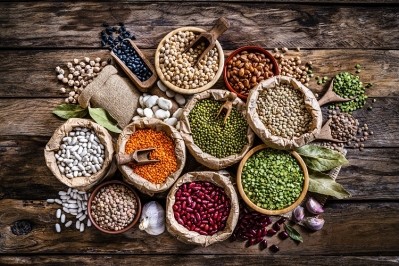Quorn, mycoprotein and the push to grow a ‘third kingdom of fungi proteins’

The negative impact to the environment associated with industrial farming is much discussed. A recent study published in Nature Communications (albeit financed by Beyond Meat and Impossible Foods) calculated that replacing half of all the pork, chicken, beef and milk consumed globally with plant-based alternatives would reduce the greenhouse gas emissions that come from agriculture by 30% by 2050.
One alternative is mycoprotein, derived from a fungus. UK-based Marlow Foods has produced mycoprotein for nearly 40 years. It is the core ingredient in over 100 Quorn branded products. According to the company, citing Carbon Trust data, mycoprotein uses 90% less land and water and produces 98% less carbon emissions than equivalent beef products.
“It's an ingredient that enables us to create delicious food. It's also incredibly efficient,” said Managing Director of Marlow Ingredients Stephanie Jochems. “Just the mycoprotein that we can grow in one day in one of our fermenters grows the equivalent protein of 100 adult cows every day.”
The ingredient can promote both human and planetary health, she told FoodNavigator’s recent Climate Smart Food digital summit. “Mycoprotein is a complete protein that contains all nine essential amino acids. It's also high in fibre and low in fat.” The company also claims it is a good source of vitamins and minerals including zinc, riboflavin, manganese and folate.
Quorn makes this dough-like material that makes up most of its products by fermenting a naturally occurring fungus (called Fusarium venenatum). This is fed with oxygen, nitrogen, glucose, and minerals in 40-metre high fermenters which run continuously for five weeks at a time.
The mushrooming world of fungi-based protein
But the vast majority of fungi strains have probably not been discovered yet, revealed Jochems. This fact offers tantalising white space opportunities for the food industry and its current quest to make plant-based products with improved organoleptic and nutritional qualities.
For example, FoodNavigator recently spoke separately to the fungi-based ingredients supplier MycoTechnology. It believes that mycelium – the fibrous root structure of mushrooms – can be used to improve the sensory, functional, and nutritional attributes of all protein products at time when demand for protein, in all its forms, is also expected to grow significantly as the global population reaches more than nine billion by 2050.
“Our mycelial fermentation platform unlocks better taste, texture, functionality, and even nutrition in plant-based products,” said Lisa Wetstone, VP, Marketing, Innovation & Growth Strategy at MycoTechnology. “For example, our FermentIQ PEA protein – pea protein fermented with mushroom mycelia – has significantly lighter colour, smoother texture, and cleaner taste and aroma than other pea proteins. This allows our customers to create alternative dairy and protein beverage products that wow consumers.”
The next wave of plant-based adoption must give consumers new and more compelling reasons to switch, she added. “Offering truly superior nutrition to animal-based meat products is a clear opportunity space – and one that brands should lean into. More generally, the industry must look beyond mimicry and focus on creating products that fit into consumer lifestyles and preferences in order to break into the mainstream.”
Quorn’s hope for a ‘third kingdom of fungi proteins’
Innovation to explore the potential of different fungi strains, meanwhile, would give a ‘tremendous’ boost to Quorn's desire to see the emergence of what Jochems called a ‘third kingdom of fungi proteins’. This aspiration saw the company become a founding member last year of the Fungi Protein Association. As well as conducting consumer research and collaboration aimed at accelerating the sector, this group advocates for fungi protein in public policy. “We would love to see fungi proteins called out much more clearly in dietary guidelines globally,” explained Jochems.
“Today mycoprotein is called out in the Eatwell guidelines in the UK. We would love to see this much more prominently in more countries so that we can educate consumers as well as dietary and culinary specialists about the benefits of fungi protein from a health, cooking and sustainability perspective.”
As well as exploring new strains, Marlow is busy looking to showcase the versatility of mycoprotein as an ingredient, revealed Jochems. “There are many things possible with strain innovation but what we know is that mycoprotein is an incredibly versatile ingredient. We know it makes fantastic meat analogues, but we know it can go beyond that as well. One of the fields we are actively exploring is in dairy, yoghurts and cheeses. We are getting some fantastic results and responses on taste, functionality and nutrition. This is really exciting opportunity for us.”
Marlow Foods has also unveiled plans to supply mycoprotein to other food and beverage manufacturers and it has already teamed up with KFC in Europe. "For the last decades Quorn has been keeping its mycoprotein and putting it only in its Quorn branded products,” explained Jochems. “By opening up with a vision of growing the category as a whole and enabling many more companies to start producing products, we can only amplify the impact we are having. We will go faster by collaboration and by making mycoprotein available to companies.”















